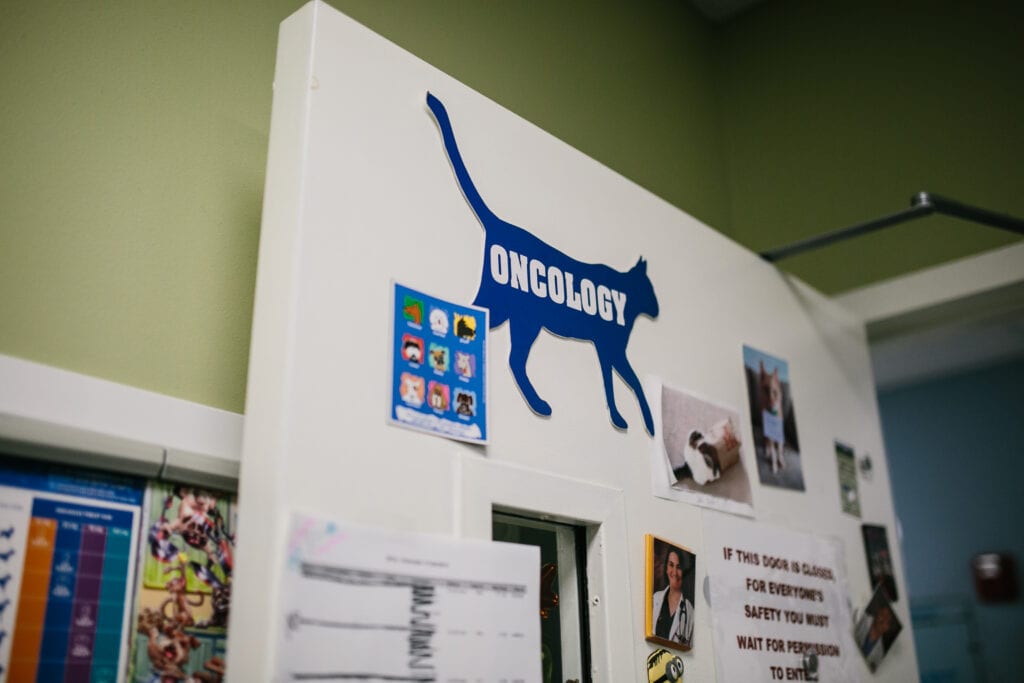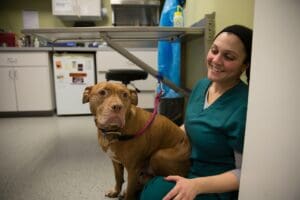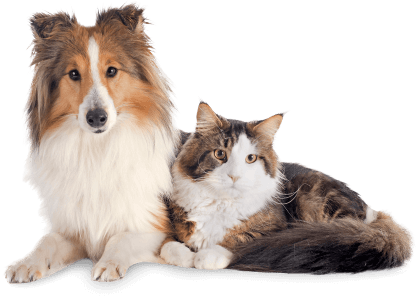Chemotherapy
 Chemotherapy drugs are used to inhibit the growth of or kill cancer cells. It can be the primary treatment to kill or slow the growth for some types of cancer. In other cases, chemotherapy is used in conjunction with radiation or surgery. When chemotherapy is used in conjunction with the other options, surgery or radiation treat the visible cancer and chemotherapy is used to destroy any cancer cells that escaped the area and are still too small to detect.
Chemotherapy drugs are used to inhibit the growth of or kill cancer cells. It can be the primary treatment to kill or slow the growth for some types of cancer. In other cases, chemotherapy is used in conjunction with radiation or surgery. When chemotherapy is used in conjunction with the other options, surgery or radiation treat the visible cancer and chemotherapy is used to destroy any cancer cells that escaped the area and are still too small to detect.
Chemotherapy is a systemic therapy utilizing drugs to damage cells that grow and divide quickly, which is why it is so effective on cancer cells. Unfortunately, most chemotherapy drugs do not specifically target only cancer cells, but may also affect normal cells that are in the process of dividing and growing. The body does have normal cells that divide rapidly which accounts for the side effects that can be seen with chemotherapy. Because the body needs time to recover from the loss of these cells, we give chemotherapy drugs in intervals.
Different types of cancer respond to different drugs. Sometimes we just use one drug and other times we will use a combination. Doses are given at intervals from daily to monthly, depending on the type of cancer and drug along with how far along a pet is in the treatment process. Chemotherapy drugs are administered intravenously, in the muscle or given orally at home and the duration of treatment depends on the type of cancer. Treatment protocols range from 19 to 52 weeks with some requiring maintenance treatment, which can last an indefinite period of time.
Why chemotherapy is different for pets than people
 The prospect of chemotherapy for a pet is frightening for many people because they’ve had personal experiences with chemotherapy or know someone who has. People are treated with very high doses because the goal is to get rid of the cancer for good. People can understand why they are getting so sick and they know that they will eventually get better. They are able to make the conscious choice to go through months of illness in exchange for years of health.
The prospect of chemotherapy for a pet is frightening for many people because they’ve had personal experiences with chemotherapy or know someone who has. People are treated with very high doses because the goal is to get rid of the cancer for good. People can understand why they are getting so sick and they know that they will eventually get better. They are able to make the conscious choice to go through months of illness in exchange for years of health.
Animals do not understand that something good can come out of being so sick. In fact, when they are sick for too long, some will lose their will to live. That’s why we use significantly lower doses of chemotherapy in pets to minimize those side effects.
Unfortunately, we are not expecting to fully kill all of the cancer with chemotherapy. Our goal at Veterinary Specialty Center is not only to keep the cancer inactive (in remission) but also to allow your pet to live a good happy life for however long that may be.
The majority of patients experience mild side effects that are easily controlled with medications. Some patients experience no side effects while others are more sensitive to certain drugs. If they do experience more severe side effects some patients will require hospital care. If this should happen we will adjust their treatment to minimize the side effects.
The primary sites of normal cells affected by chemotherapy
The goal of chemotherapy is to kill and slow the growth of cancer cells while inducing minimal negative effects on normal cells. Although that is the goal, there are certain areas of the body where normal cells are more affected by chemotherapy than others.
Bone marrow
Bone marrow is where the blood cells are produced. Chemotherapy can temporarily decrease the number of white blood cells, which help fight infection, and platelets, which are responsible for forming blood clots to stop bleeding. For many chemotherapy medications these effects usually occur three to seven days after treatment. Although this is usually temporary, the body still needs time to produce sufficient cells to be back to a normal level. Bone marrow suppression can be more severe when Carboplatin, Doxorubicin (Adriamycin), or Lomustine (CCNU) are administered.
Gastrointestinal tract
The most common side effects are nausea, decreased appetite, vomiting, diarrhea and lethargy. If any of these side effects occur, it will usually happen two to five days after treatment. Fortunately, we have reliable medications that can help to minimize and control these side effects. These side effects are more common in patients receiving Carboplatin or Doxorubicin (Adriamycin). When these chemotherapy drugs are used, patients are sent home with preventative medications to help minimize the symptoms.
Hair follicles
Hair loss (alopecia) after chemotherapy is most common in non-shedding breeds of dogs such as Poodles, Bichon Frise, Shih Tzu, Old English Sheepdogs and most terriers. Depending on which drugs are used and the longevity of the protocol, the alopecia can range from thinning to complete loss, which is unusual. The hair does grow back, but it may change color and/or texture. Doxorubicin (Adriamycin) is the drug that generally causes the most pronounced alopecia.
Side Effects
Although smaller doses of chemotherapy are given to pets, that doesn’t mean that your pet will not have side effects from the treatment. Changes in appetite, diarrhea, lethargy, allergic reactions and other side effects are common. There are also many options to help lessen the side effects for your pet while he or she is undergoing treatment.
Loss of appetite
This is one of the more common side effects and may occur after a dose of any chemotherapeutic drug. Loss of appetite may last a day or two, which would probably be indicative of some nausea. Your pet may need to be prescribed anti-nausea medication. If your pet experiences a loss of appetite, feed him or her frequent, small meals.
It’s preferable to keep your pet on normal food, but you may need to introduce some bland food to increase your pet’s interest in eating. Bland foods mean no high fat or heavily spiced food. Some good options included:
- Boiled chicken or hamburger or canned chicken in water (not gravy). Mix the meat with some white rice or boiled potatoes.
- Low-fat yogurt or cottage cheese.
- Cooked eggs. These can be easily prepared in the microwave, but do not use butter.
- Canned food (if your pet normally eats kibble). Remember to use a bland or sensitive stomach formulation.
- Baby food. Use products that are meat only and with no onion powder.
- Cooked fish or canned fish (in water) can entice dogs and cats
- If you need to encourage your pet to drink for some reason, adding a little low fat, low sodium broth to water can be helpful
Vomiting
If your pet is vomiting, pick up all food and water. Do not allow access to either for six to eight hours. Sometimes people think this may dehydrate their pet, but actually, if a pet drinks water and then proceeds to vomit it will become more dehydrated than if he or she drank nothing. After six to eight hours, offer a small amount of water or ice. If your pet does not vomit, continue to offer small amounts of water at intervals.
After four to six hours, offer a small amount of bland food. Gradually mix in the normal diet over the next few days. If your pet continues to vomit after following the above instructions, please do not hesitate to call Veterinary Specialty Center. Your pet’s oncologist may prescribe an anti-nausea medication for your pet.
Chemotherapeutic drugs which are more likely to cause vomiting are Doxorubicin (Adriamycin), Cisplatin, Streptazatocin (Zanozar), Carboplatin, and Elspar (L-asparaginase)
Diarrhea
Diarrhea is not as serious a concern as vomiting as long as your pet maintains adequate hydration and energy levels. Sometimes there may be small drops of red (fresh) blood in the stool, which is merely a sign of irritation of the bowel. Diarrhea sometimes takes several days to a week to resolve.
One at-home remedy is adding white rice to your pet’s food to bulk up the stool. Also, try to avoid any food or treats besides your pet’s normal food to minimize irritation. There are some medications that can be prescribed if the diarrhea is not resolving. Do not use human products like Kaopectate or Pepto-Bismol as these contain aspirin products. Do not use products like Imodium or Lomotil as these tend to stop intestinal motility.
